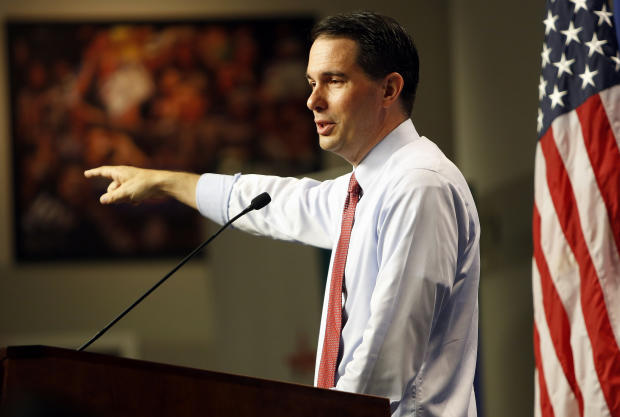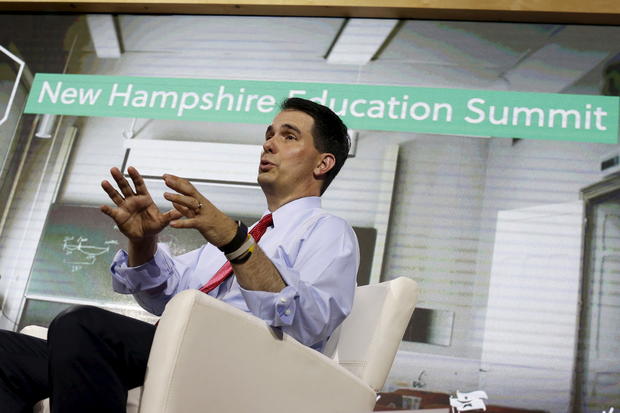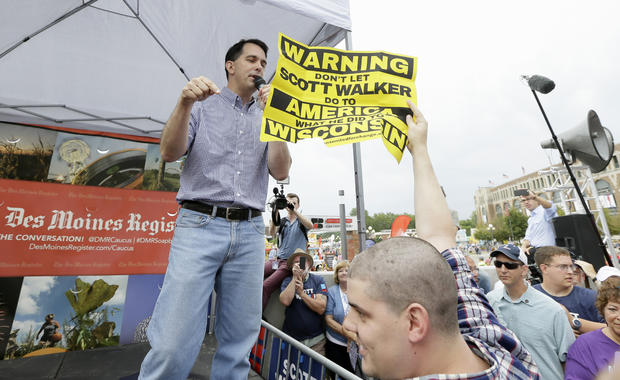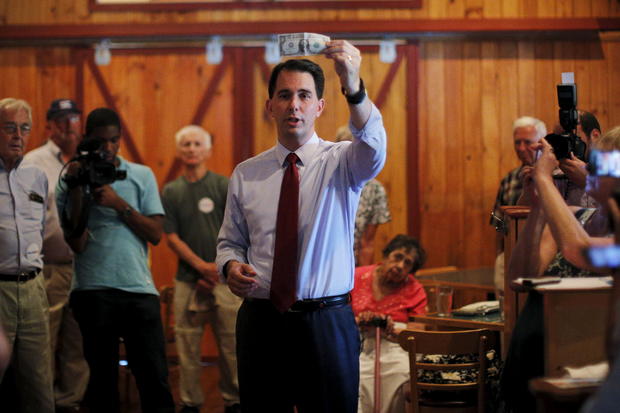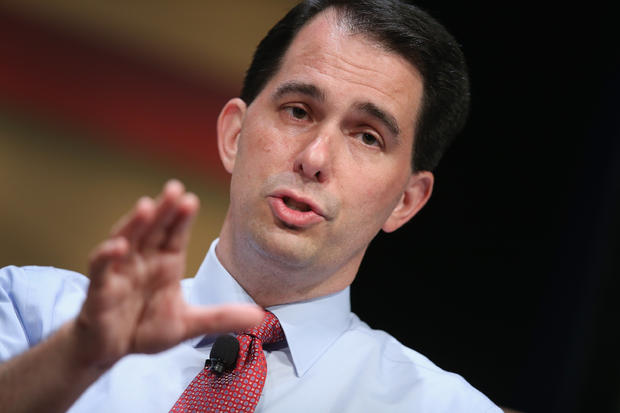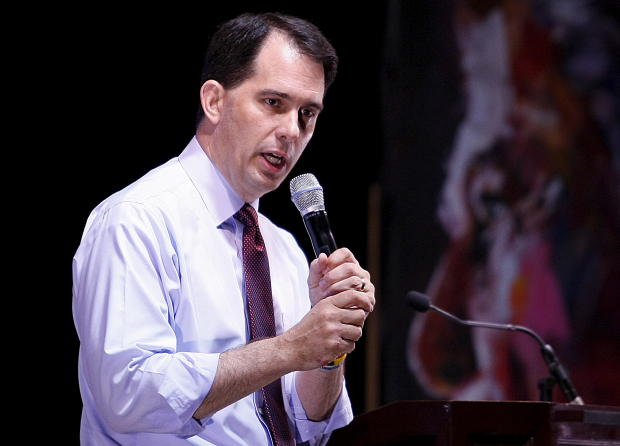Scott Walker: What does he stand for?
This article is the latest in a continuing series examining where the 2016 candidates stand on five key issues. Click here to read about Jeb Bush, Hillary Clinton, John Kasich and Bernie Sanders.
In the months before Wisconsin Gov. Scott Walker entered the presidential race, he was vaulted into the top tier of Republican candidates by delivering a rousing speech to conservative activists in Iowa. He entered the race in July, at the top of the pack but began to slide once Donald Trump declared his candidacy and upended the field.
Walker caught the attention of national Republicans when he took up a fight against some of the state's public employee unions in 2011 and proposed a bill to eliminate collective bargaining. The move sparked raucous protests at the State Capitol building in Madison and an effort to recall Walker from office. After a fierce battle, he prevailed on June 5, 2012, becoming the first governor in U.S. history to survive a recall attempt. It was the second of three statewide elections he would win in a four-year period (the other two were his election and re-election as governor).
That fight is the conservative calling card of his presidential campaign, since Walker announced his candidacy. "My record shows that I know how to fight and win. Now, more than ever, America needs a president who will fight and win for America," Walker said.
But he also toes conservative orthodoxy on almost every other issue ranging from education to abortion to same-sex marriage, and has shifted his position on immigration in recent years to back away from a pathway to citizenship.
Here's a look at were Scott Walker stands on the issues.
Education
Walker's most recent moves on higher education have also been controversial. A day before officially entering the presidential race, he signed a budget cutting $250 million from university funding. A month later, he approved $250 million in state funding for a basketball arena. The governor also came under fire for an apparent attempt to revise the University of Wisconsin's mission statement.
When Walker took on public sector unions in 2011, "it wasn't just about unions," the governor insisted earlier this month at an education forum in New Hampshire. "It was really about education reform."
While the 2011 fight with teachers' unions was highly controversial, Walker insisted that he was helping teachers by eliminating union policies like seniority-based hiring and firing practices. "I can tell when a teacher is supportive of what I've done," Walker said at the forum, "because they lean into me, look both ways and whisper, 'Thank you.'"
At the New Hampshire event, Walker repeatedly spoke about "barriers" keeping the school system from improving. Along with teachers' unions, the governor said the federal government -- and the Department of Education specifically -- need to play a less active role in running schools and hand more control to state and local governments. He touted the benefits of charter schools and vouchers.
As for the notorious Common Core standards that have angered conservatives, Walker has pointed out that part of the rules were enacted in Wisconsin before he took office. On the campaign trail, he now often says, "No Common Core, no national school board" when talking about education standards.
Immigration
Walker's immigration views have shifted substantially since 2013, when he told the Wausau Daily Herald that he could envision a pathway to citizenship for people in the U.S. illegally. But when began gearing up for his presidential campaign, he went on Fox News and said, "My view has changed. I'm flat out saying it."
He said that his views were motivated in part by opposition to President Obama's executive actions on immigration and pointed out that he was among the first governors to challenge the president in a lawsuit.
In recent weeks, he has struggled with the question of whether he would seek to end birthright citizenship. He first said that he would change the law, then that he wouldn't take a position on the issue, and finally, on ABC's "This Week" Sunday, affirmed that he wasn't proposing any chances to the 14th Amendment.
Like many of his fellow Republicans, Walker has also refused to say what he would do about the more than 11 million immigrants living in the U.S. illegally.
"My belief is that because the system is so broken, we need to do the other things I mention before we can even begin to start talking about what the president and the next Congress can do," Walker told the Tampa Bay Times in June, referring to his call for more border security and enforcement of existing law. "Until we deal with those other issues, any potential solution is largely irrelevant."
Economy
Broadly, Walker believes in cutting taxes to help spur economic growth and cutting spending to slash deficits. He pursued the 2011 bill to end collective bargaining rights for unions as a way to close Wisconsin's budget shortfall, and has cut taxes on income, property and certain businesses by $2 billion. On the campaign trail, he likes to compare tax policy to selling shirts at Kohls: He says the company makes more money by selling a larger volume of cheap shirts.
"They could charge you $29.99 and a few of you could afford it or they can lower the price and broaden the base and make more money off of volume," he said when he announced his campaign in July. "That's what I think about your money - the taxpayers' money. The government could charge the higher rates and a few of you could afford it. Or, we can lower the rates and broaden the base and increase the volume of people participating in our economy."
Walker has also billed his replacement for the Affordable Care Act (ACA) as a massive tax cut because it repeals the entirety of the heath care law and replaces mandatory health insurance with tax credits to help Americans purchase insurance.
In that speech he also argued that Wisconsin has made it easier for people to get jobs by requiring that welfare recipients be enrolled in a job-training program. He also just signed a budget that requires drug testing for food stamp recipients (Wisconsin is at odds with federal officials, who say the move is illegal).
He has called Democratic proposals to raise the minimum wage "lame" and instead argued in favor of helping people get skills that will allow them to seek better-paying jobs. He also wants to build the Keystone XL pipeline and urged Congress to give the president fast-track authority for a massive free trade deal with Asia.
Social issues
Walker has some of the most restrictive views on abortion among the Republican field, opposing the procedure in all cases with no exceptions for rape, incest, or the life of the mother. He recently signed into law a ban on abortions after 20 weeks of pregnancy, and likes to remind voters that Wisconsin cut off state funds to Planned Parenthood. Earlier this month, he said he supports legislation to end all federal funding of Planned Parenthood, most of which comes as Medicaid payments to the group for providing non-abortion health procedures like breast cancer screenings for low-income women.
He also opposes same-sex marriage, an issue on which he disagrees with his two sons. When the Supreme Court legalized same-sex marriage nationwide earlier this year Walker labeled the decision a "grave mistake" and scolded "five unelected judges" for taking it "upon themselves to redefine the institution of marriage." He called for a constitutional amendment that would preserve the rights of individual states to legalize or ban same-sex marriage.
He has, however, attended the wedding of a family member who is gay despite his belief that marriage is between one man and one woman.
Foreign policy
Like some of the other governors seeking the GOP nomination, Walker has turned to various Republican foreign policy experts to give him a crash-course tutorial on the ways of the world, after a few public blunders that highlighted the lack of attention he's paid to foreign affairs in the months leading up to his campaign.
He has taken some more concrete positions since launching his presidential bid. He has said he is "prepared to put boots on the ground if that's what it takes" to defeat the Islamic State of Iraq and Syria (ISIS). Earlier this year, he told the Weekly Standard that the U.S. should provide lethal Ukrainians to help them combat a Russian incursion into the eastern part of the country.
He has become more strident about China and says the U.S. must confront them over cyber-attacks that target American companies and the government. On Monday, he called on President Obama to cancel an upcoming state visit by Chinese President Xi Jinping "over its increasing attempts to undermine U.S. interests," including currency manipulation that contributed to Monday's economic meltdown.
He has repeatedly pledged to do away with the Iran nuclear agreement on his first day in office, calling it "one of America's worst diplomatic failures." And he has been harshly critical of the president for restoring diplomatic relations with Cuba.
